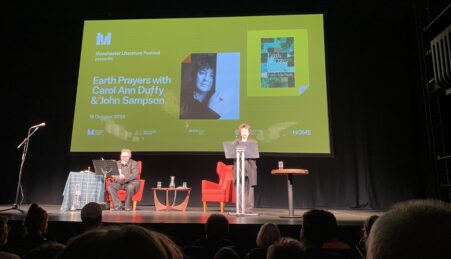By Jacqueline Grima
Academics and research students from across the UK gathered at Manchester Metropolitan University (MMU) this week for the North West Long 19th Century Seminar. The seminar, organised and hosted by Department of English Senior Lecturer, Dr Emma Liggins, focussed on the Fin de Siècle, or end of the 19th century, period.
 The first speaker of the day was Dr Deborah Mutch from Leicester’s De Montfort University, introduced by Chair, Margaret Beetham. Deborah talked about the emergence of the socialist press in the late 19th century and, in particular, the space socialist periodicals allocated to serialised fiction. She looked particularly at the incomplete serial, Connie, by Margaret Harkness, an active socialist who often wrote under the pseudonym John Law.
The first speaker of the day was Dr Deborah Mutch from Leicester’s De Montfort University, introduced by Chair, Margaret Beetham. Deborah talked about the emergence of the socialist press in the late 19th century and, in particular, the space socialist periodicals allocated to serialised fiction. She looked particularly at the incomplete serial, Connie, by Margaret Harkness, an active socialist who often wrote under the pseudonym John Law.
Next, Edge Hill University PhD research student, Linda Friday, discussed the importance of location in the urban gothic novel, Dracula. In the novel, Count Dracula’s primary residence in Purfleet, Essex, is distinctly suburban, a seemingly, “ideal location for an un-dead vampiric predator,” that has often been overlooked in studies. Linda suggested that, with Purfleet’s controversial history during which some dreadful crimes were committed, anyone “familiar with the activities in Purfleet creates nuances within the novel.” She also said that location in any novel will perhaps create different meanings and resonances for each individual reader.
The last speaker of the morning was doctoral student, Gemma Outen, also from Edge Hill. In her presentation, ‘Is Cycling Healthy for Women?’, Gemma examined the representation of women in the monthly temperance movement periodical, Wings. In the magazine, Victorian women were often portrayed as fragile and delicate, the pressure they were under to look after their own and their family’s health reflected in the magazine’s advertisements. For example, corsets were advertised as essential for the improvement of women’s health, often seemingly endorsed by the medical profession.
The magazine also suggested that cycling was an appropriate and acceptable form of exercise for women, providing, of course, that women stuck to the rules that were set by men! When one audience member suggested that not much seemed to have changed for women, Gemma agreed. She said, “Women are still being told to eat less or to look a certain way.”
After a pleasant lunch, the afternoon session began with a talk by Senior Lecturer in English at Liverpool John Moores University, Dr Sondeep Kandola. Sondeep discussed how, in varying versions of Oscar Wilde’s novel, The Picture of Dorian Grey, Wilde’s nationalistic and anti-imperialistic beliefs were perhaps exaggerated according to the context in which the version of the novel was released. For example, some versions were particularly impacted by scandal surrounding founder of the Irish Parliamentary Party, Charles Parnell, and the introduction of new character, James Vane, seeking revenge for his sister’s death, can, according to Sondeep, “be simultaneously read as a potent allegory of Ireland’s land wars.”
Following Sondeep, MMU’s Dr Kirsty Bunting discussed our often complex emotional reactions to the beauty of art  with particular reference to the experiments of Vernon Lee and Clementina Anstruther-Thompson. Recreating the experiment, Kirsty showed the audience a slide of Titian’s Sacred and Profane Love and asked the audience to think about their emotional reactions to the painting such as changes in breathing patterns and awareness of any revitalising or depressing effects. Kirsty also pointed out that sharing the experience with a neighbour is known as ‘aesthetic sociability’.
with particular reference to the experiments of Vernon Lee and Clementina Anstruther-Thompson. Recreating the experiment, Kirsty showed the audience a slide of Titian’s Sacred and Profane Love and asked the audience to think about their emotional reactions to the painting such as changes in breathing patterns and awareness of any revitalising or depressing effects. Kirsty also pointed out that sharing the experience with a neighbour is known as ‘aesthetic sociability’.
The last two speakers of the day were MMU’s Dr Angelica Michelis and Liverpool John Moores research student, Sarah Gilbert. Angelica’s talk focussed on the sexual identity of women in an urban environment with particular reference to the poetry of Amy Levy (1861-1889) whose poem A London Plane-Tree appears to suggest the poet’s comfort in her London surroundings. Sarah discussed the portrayal of women in the New Woman Fiction movement, looking particularly at the 19th Century Sarah Grand novel, The Heavenly Twins.
Speaking to Humanity Hallows, Emma Liggins said how pleased she was with how the day-long event had been received. “The seminar brought together postgraduate, early-career researchers and established scholars from the North West and beyond to exchange ideas and debate issues about the long 19th century. Postgraduates who attended have told me that they found the event very friendly and a good place to try out ideas.”
Deborah Mutch added, “I think the seminar has been an incredibly useful and collaborative gathering of academics in an open and friendly atmosphere, brought about by Emma’s exceptional hosting and organisational skills. It has also been great to get feedback on our research from an audience.”
To find out more about upcoming events, contact Emma Liggins in MMU’s Department of English.
Jacqueline Grima is currently studying for an MA in Creative Writing. When not writing, she loves listening to music, going to concerts and baking. Follow her on Twitter @GrimaJgrima







Leave a reply